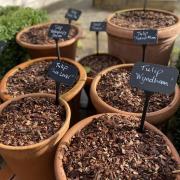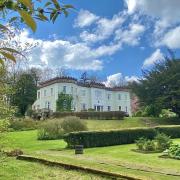What a difference six months make. Back in November 2023 we featured a mammoth effort by the garden team at Holker Hall as they set about planting more than 22,000 bulbs in just a few weeks.
The tulip displays in the spectacular 25-acre garden at Cark have become a tourist attraction in their own right, and head gardener Matthew Murgatroyd, who was previously deputy head of gardens at Highgrove, the private residence of King Charles and Queen Camilla, wanted to mark his first year with a special addition.
In one of the biggest plantings ever at Holker, the six-strong team pushed 36 different varieties of tulip bulbs, including Angelique, Black Parrot and White Prince, using an armoury of trowels, bulb planters and crowbars.
![Head gardener Matthew Murgatroyd planting bulbs at Holker Hall last November [credit Jonathan Becker]](https://www.greatbritishlife.co.uk/resources/images/18096690/?type=mds-article-575)
Cumbria Life returned to find out how the flowers were looking to be greeted by a magnificent display.
Bulb planting was not the only work going on during the winter at the grade II listed hall and gardens, which have been developed by the Cavendish family since the 1600s.
A cascading water feature in the grounds has been restored to its former glory thanks to a £250,000 investment in the gardens.

Crumbling pointing and leaks meant the Neptune Cascade had been reduced to a trickle in recent years. Now, water is tumbling down the limestone and slate feature once again following a 20-week winter restoration project, spearheaded by Matthew.
“The leaks in the cascade’s infrastructure meant we were losing thousands of litres of water every day,” he explains. “We knew that a ‘patch up’ job wouldn’t work – we had to underpin the whole structure and replace the pipes.
“We now have a hi-tech, brand new pump system in place, which is helping us to conserve water and also tap into a natural spring on site so that we can direct water to where it is most needed.”

At the heart of the Neptune Cascade is the historic Burlington Fountain, which dates back to the 1890s. The fountain inspired a ‘grand design’ project by Lord and Lady Cavendish in the 1980s, which featured the addition of a 17th century marble statue of Neptune, a gift to Lady Cavendish.
Water from a natural spring is guided down a series of rills and falls towards the fountain.
Meanwhile, a handful of old underground, brick built Victorian rain tanks will continue to harvest rainwater across the estate while a new tank sunk underground close to the fountain will act as a ‘buffer’ to store reserves.

“We don’t expect a drought here in Cumbria,” adds Matthew, “but we have to plan for all eventualities.”
He has also replaced inefficient sprinklers with a drip irrigation system, inspired by his environmentally conscious work at Highgrove. The garden team is working on landscaping around the cascade with plans for drifts of pastel colours through the spring and summer and a new scented walk through the dappled shade of ancient woods.
“Holker is a garden where people are free to roam around,” says Matthew. “There aren’t the restrictions you find elsewhere, and spring is such a wonderful time to visit.”
The investment has helped transform another part of the gardens, a new children’s play area called Willow Den.

A hollowed-out oak tree provides a tunnel or climbing frame, while slate from Burlington Stone – also owned by Holker Group – has been used to create a ‘ruin’ where youngsters can pretend to dine or simply wander.
Living willow forms the walls, and there is a mock chimney stack and ‘ruined’ fireplace and access to a viewing tower.
Fran Horne, head of visitor services, says: “We’ve been working hard behind the scenes to prepare for welcoming our visitors back to Holker in the new 2024 season. We wanted to develop a new area within the gardens to encourage young people to explore nature. Willow Den is the perfect place for children to play and use their imaginations within a natural setting. Since we reopened in March, we’ve had such positive feedback. They really love it.”
Holker Hall and Gardens has recently been shortlisted for the 2024 Garden of the Year Award. The results of the online public vote will be announced in November.
.
































